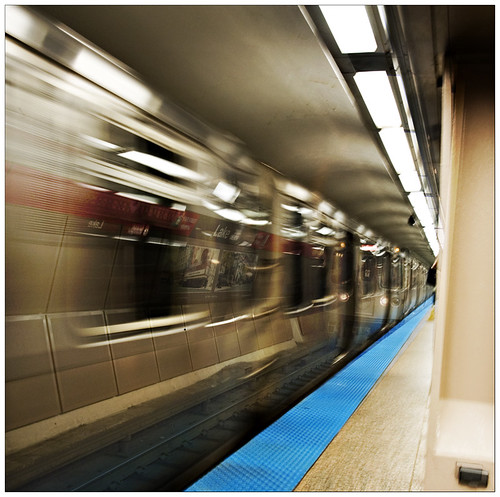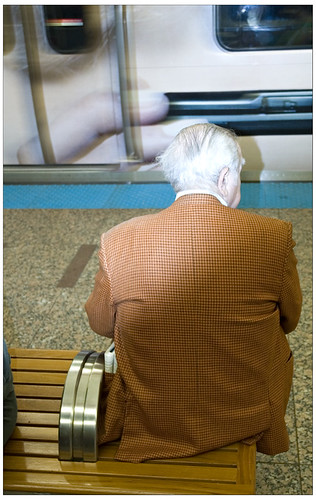
According to today's Tribune, our Gov Blah Blah has generously filched money from the 2008 budget to prop up the CTA 2007 budget. Of course, this only makes the long term problem worse, but hey, he fulfilled his wish of getting his face in the media.
The CTA agreed to accept $24 million in stopgap state funding Wednesday to avert the doomsday service cuts and fare hikes set to take effect next week, but the cash advance only puts the agency in a deeper financial hole. If approved by the Regional Transportation Authority, the money would hold off fare hikes and service cuts until November, officials said. But the emergency cash offered by Gov. Rod Blagojevich is an advance on CTAs portion of the 2008 state budget and could mean even more drastic cuts and hikes if the governor and lawmakers cannot agree on a long-term solution.
...
Under increasing pressure to help resolve the mass transit crisis, Blagojevich offered to come up with the emergency funding by essentially advancing money already earmarked for the RTA in the 2008 budget. The CTA's share would be $24 million.
I had sent an email to various Illinois politicians re: their priorities, Tom Cross responds thusly:
Thank you for your correspondence regarding our need to invest in the future of our State by investing in mass transit. We are at a critical juncture in our state's history when it comes to this issue. We can either choose to enhance and expand our public transportation options, or we can watch our public transportation system dwindle and bring our state's economy down with it.
The General Assembly is currently reviewing several proposals to add crucial funding to the Regional Transportation Authority, Chicago Transit Authority, Metra, and Pace. The need to face this problem is great, as if we allow our mass transit options to decline, it will be twice as hard for the State to build that system back up, let alone improve it.
In the coming weeks and months both state and local elected officials will continue to meet and discuss possible solutions to our common problems. It is important that we continue to debate these matters thoroughly because the decisions we make today will affect our state for generations to come. It is also important that the citizens of Illinois continue to be engaged in this public debate as well, because elected officials rely on the opinions of their constituents when making such important decisions.
It is also noteworthy that any capital bill to provide for infrastructure improvements that passes the General Assembly must pass by a 3/5ths vote instead of a simple majority. That means that the House Republicans will be actively engaged in this debate, and our opinions and views will be considered before any final agreement is reached.
Again, thank you for your interest in this matter, and you can rest assured that the General Assembly and the House Republicans are working
diligently to finding a solution that will allow us to invest in our future. Sincerely,
Tom Cross
 More:
CTA offered reprieve till Nov. 4 -- chicagotribune.com:
More:
CTA offered reprieve till Nov. 4 -- chicagotribune.com:
CTA President Ron Huberman acknowledged CTA riders “are very frustrated with doomsday after doomsday after doomsday. I was talking to a CTA employee the other day who has now been told they are going to be laid off on four different dates.”
The House last week rejected a comprehensive mass transit funding bill that would have raised $435 million from increasing the RTA sales tax in the six-county area, and increasing the property-transfer tax in Chicago.
Although lawmakers welcomed the extra time, they wondered on Wednesday why it took so long for the governor to get involved in the issue.
“This has been a looming problem for months and months and he finally wakes up and does not do a whole lot, but he is a little involved,” said Steve Brown, spokesman for House Speaker Michael Madigan (D-Chicago).
“Today's action by the governor takes pressure off the legislature, and we haven't done so well operating without pressure this year,” said Rep. Julie Hamos (D-Evanston), chairman of the House Mass Transit Committee.
Hamos added: “It's sort of like taking your credit card—which you already owe a lot of money on—and getting a big cash advance. You don't have more money. You just have to repay it later on.”
Some municipal watchdogs agreed, saying advancing state reimbursements to the CTA is risky because it could lead to even larger deficits, service cuts and fare increases in 2008 and beyond.
“Blagojevich is basically increasing the advance on the credit card to the CTA,” said Laurence Msall, president of the Civic Federation of Chicago. “It does nothing to address the CTA's employee pension and retiree health-care reforms that are needed.”
